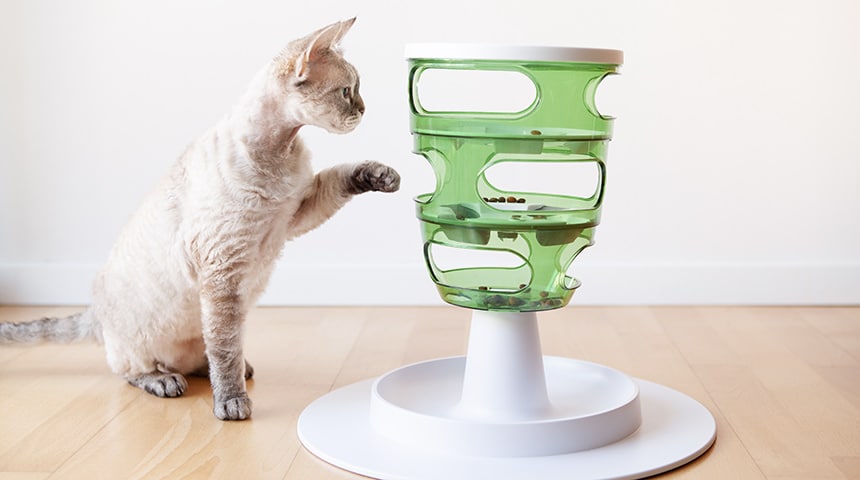
The way we feed our cats is of great importance, because it directly influences their health and longevity. But how can you make the right choice and find what is best suited for your cat, both in terms of taste and health? And once your choice is settled on a type of diet, what are the serving portions and meal times to follow?
A cat is more difficult to feed than a dog. If a cat does is not satisfied by his food, he can develop behavioral problems. The cats’ appetite is strongly related to the smell and the temperature of the food. The cat will detect four flavours, such as salty, bitter, sweet, and acid. If the food is not completely fresh, your cat could lift their nose and refuse to touch it. Same for their water: it must be changed 2 to 3 times a day. A good feline diet is developed according to their specific nutritional needs. It is usually found in dry meat form, such as small kibble, or wet, in the form of mixtures in tin cans.
Homemade food
There are a multitude of recipes adapted for the nutritional needs of your cat. They consist in a mixture of vegetables, starches (carbohydrates) and cooked meat. You have to pay special attention because, although it can be balanced if sufficient effort is put into it, this type of diet is very restrictive for you because you really have to "calculate" and cook the portions daily. Moreover, after having tasted your homemade food, your cat will surely no longer be interested in any kind of industrial kibble, and you will have to take this into consideration when traveling or while on vacation. If you have time and would like to prepare meals for your cat, please contact us. There are a range of recipes tailored to your pet's needs. Since cats are almost exclusively carnivorous, 65% raw meat, 10% vegetables, 25% cereals and 10% various nutrients are needed. For a multi-cat home, the diet needs to be balanced for each individual cat, so different recipes for every cat.
Veterinary diets including kibble and canned food
Like the vast majority of veterinarians, we recommend that you choose a food specially developed by animal nutrition specialists: this is the type of food that can be purchased in our veterinary boutiques. This type of food is designed by considering all nutritional needs of your pets and their life stages. The food is developed by animal nutrition specialists and is required to pass a variety of quality tests before being put on the market. In addition, our dedicated staff can advise and guide your choice while keeping in mind your pet’s medical history.
What should you avoid?
We regularly hear: “Yes, but I do not want him to get bored with his food…” Be careful, you must avoid changing your cat’s diet too regularly. Even if you find it monotonous, your cat likes it, and his body is used to it. With sudden diet changes, your cat's digestive system could become a little irritated, which can lead to diarrhea or vomiting. Unlike dogs, cats are carnivores. Their needs for animal-based nutrients (mostly proteins) are much higher. Cat food and dog food are similar but not identical. Feline diets include an important element, taurine, which is an essential amino acid. Cats produce very little taurine, so they have to eat it in their daily diet. Otherwise, they can develop serious health problems such as heart disease. In comparison, dog diets contain little or no taurine. It is therefore important to not to feed your cat any dog food.
To conclude, the list of foods to avoid for cats is long enough, but worth a look. Your cat should have no sugar or food that is too salty, such as canned tuna. Avoid garlic, onions, avocado, olives, and grapes, because they are toxic to both dogs and cats and can cause serious health problems. Bread and all types of pastries are also to be avoided. Just like ice cream, yogurt, chocolate, and caffeine. You shouldn’t give your cat sweets or fatty treats, he could become obese which would make them more prone to developing diseases. For more information, please read our blog article.
If you follow the basic rules to provide a good balanced diet to your pet, this will promote his growth and will ensure a better health for his entire life!

